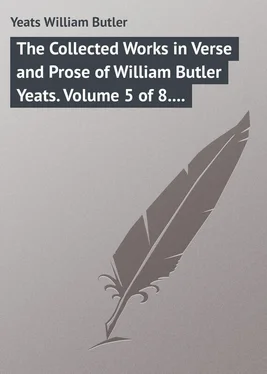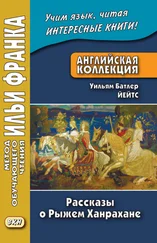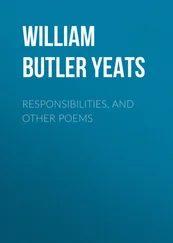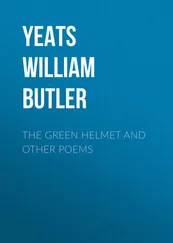William Yeats - The Collected Works in Verse and Prose of William Butler Yeats. Volume 5 of 8. The Celtic Twilight and Stories of Red Hanrahan
Здесь есть возможность читать онлайн «William Yeats - The Collected Works in Verse and Prose of William Butler Yeats. Volume 5 of 8. The Celtic Twilight and Stories of Red Hanrahan» — ознакомительный отрывок электронной книги совершенно бесплатно, а после прочтения отрывка купить полную версию. В некоторых случаях можно слушать аудио, скачать через торрент в формате fb2 и присутствует краткое содержание. ISBN: , Жанр: foreign_language, foreign_prose, на английском языке. Описание произведения, (предисловие) а так же отзывы посетителей доступны на портале библиотеки ЛибКат.
- Название:The Collected Works in Verse and Prose of William Butler Yeats. Volume 5 of 8. The Celtic Twilight and Stories of Red Hanrahan
- Автор:
- Жанр:
- Год:неизвестен
- ISBN:http://www.gutenberg.org/ebooks/49612
- Рейтинг книги:4 / 5. Голосов: 1
-
Избранное:Добавить в избранное
- Отзывы:
-
Ваша оценка:
- 80
- 1
- 2
- 3
- 4
- 5
The Collected Works in Verse and Prose of William Butler Yeats. Volume 5 of 8. The Celtic Twilight and Stories of Red Hanrahan: краткое содержание, описание и аннотация
Предлагаем к чтению аннотацию, описание, краткое содержание или предисловие (зависит от того, что написал сам автор книги «The Collected Works in Verse and Prose of William Butler Yeats. Volume 5 of 8. The Celtic Twilight and Stories of Red Hanrahan»). Если вы не нашли необходимую информацию о книге — напишите в комментариях, мы постараемся отыскать её.
The Collected Works in Verse and Prose of William Butler Yeats. Volume 5 of 8. The Celtic Twilight and Stories of Red Hanrahan — читать онлайн ознакомительный отрывок
Ниже представлен текст книги, разбитый по страницам. Система сохранения места последней прочитанной страницы, позволяет с удобством читать онлайн бесплатно книгу «The Collected Works in Verse and Prose of William Butler Yeats. Volume 5 of 8. The Celtic Twilight and Stories of Red Hanrahan», без необходимости каждый раз заново искать на чём Вы остановились. Поставьте закладку, и сможете в любой момент перейти на страницу, на которой закончили чтение.
Интервал:
Закладка:
I said to the more powerful of the two sorcerers – ‘What would happen if one of your spirits had overpowered me?’ ‘You would go out of this room,’ he answered, ‘with his character added to your own.’ I asked about the origin of his sorcery, but got little of importance, except that he had learned it from his father. He would not tell me more, for he had, it appeared, taken a vow of secrecy.
For some days I could not get over the feeling of having a number of deformed and grotesque figures lingering about me. The Bright Powers are always beautiful and desirable, and the Dim Powers are now beautiful, now quaintly grotesque, but the Dark Powers express their unbalanced natures in shapes of ugliness and horror.
THE DEVIL
My old Mayo woman told me one day that something very bad had come down the road and gone into the house opposite, and though she would not say what it was, I knew quite well. Another day she told me of two friends of hers who had been made love to by one whom they believed to be the devil. One of them was standing by the road-side when he came by on horseback, and asked her to mount up behind him, and go riding. When she would not he vanished. The other was out on the road late at night waiting for her young man, when something came flapping and rolling along the road up to her feet. It had the likeness of a newspaper, and presently it flapped up into her face, and she knew by the size of it that it was the Irish Times . All of a sudden it changed into a young man, who asked her to go walking with him. She would not, and he vanished.
I know of an old man too, on the slopes of Ben Bulben, who found the devil ringing a bell under his bed, and he went off and stole the chapel bell and rang him out. It may be that this, like the others, was not the devil at all, but some poor wood spirit whose cloven feet had got him into trouble.
HAPPY AND UNHAPPY THEOLOGIANS
A Mayo woman once said to me, ‘I knew a servant girl who hung herself for the love of God. She was lonely for the priest and her society, 5 5 The religious society she had belonged to.
and hung herself to the banisters with a scarf. She was no sooner dead than she became white as a lily, and if it had been murder or suicide she would have become black as black. They gave her Christian burial, and the priest said she was no sooner dead than she was with the Lord. So nothing matters that you do for the love of God.’ I do not wonder at the pleasure she has in telling this story, for she herself loves all holy things with an ardour that brings them quickly to her lips. She told me once that she never hears anything described in a sermon that she does not afterwards see with her eyes. She has described to me the gates of Purgatory as they showed themselves to her eyes, but I remember nothing of the description except that she could not see the souls in trouble but only the gates. Her mind continually dwells on what is pleasant and beautiful. One day she asked me what month and what flower were the most beautiful. When I answered that I did not know, she said, ‘The month of May, because of the Virgin, and the lily of the valley, because it never sinned, but came pure out of the rocks,’ and then she asked, ‘What is the cause of the three cold months of winter?’ I did not know even that, and so she said, ‘The sin of man and the vengeance of God.’ Christ Himself was not only blessed, but perfect in all manly proportions in her eyes, so much do beauty and holiness go together in her thoughts. He alone of all men was exactly six feet high, all others are a little more or a little less.
Her thoughts and her sights of the people of faery are pleasant and beautiful too, and I have never heard her call them the Fallen Angels. They are people like ourselves, only better-looking, and many and many a time she has gone to the window to watch them drive their waggons through the sky, waggon behind waggon in long line, or to the door to hear them singing and dancing in the Forth. They sing chiefly, it seems, a song called ‘The Distant Waterfall,’ and though they once knocked her down she never thinks badly of them. She saw them most easily when she was in service in King’s County, and one morning a little while ago she said to me, ‘Last night I was waiting up for the master and it was a quarter-past eleven. I heard a bang right down on the table. “King’s County all over,” says I, and I laughed till I was near dead. It was a warning I was staying too long. They wanted the place to themselves.’ I told her once of somebody who saw a faery and fainted, and she said, ‘It could not have been a faery, but some bad thing, nobody could faint at a faery. It was a demon. I was not afraid when they near put me, and the bed under me, out through the roof. I wasn’t afraid either when you were at some work and I heard a thing coming flop-flop up the stairs like an eel, and squealing. It went to all the doors. It could not get in where I was. I would have sent it through the universe like a flash of fire. There was a man in my place, a tearing fellow, and he put one of them down. He went out to meet it on the road, but he must have been told the words. But the faeries are the best neighbours. If you do good to them they will do good to you, but they don’t like you to be on their path.’ Another time she said to me, ‘They are always good to the poor.’
There is, however, a man in a Galway village who can see nothing but wickedness. Some think him very holy, and others think him a little crazed, but some of his talk reminds one of those old Irish visions of the Three Worlds, which are supposed to have give Dante the plan of the Divine Comedy . But I could not imagine this man seeing Paradise. He is especially angry with the people of faery, and describes the faun-like feet that are so common among them, who are indeed children of Pan, to prove them children of Satan. He will not grant that ‘they carry away women, though there are many that say so,’ but he is certain that they are ‘as thick as the sands of the sea about us, and they tempt poor mortals.’
He says, ‘There is a priest I know of was looking along the ground like as if he was hunting for something, and a voice said to him, “If you want to see them you’ll see enough of them,” and his eyes were opened and he saw the ground thick with them. Singing they do be sometimes, and dancing, but all the time they have cloven feet.’ Yet he was so scornful of unchristian things for all their dancing and singing that he thinks that ‘you have only to bid them begone and they will go. It was one night,’ he says, ‘after walking back from Kinvara and down by the wood beyond I felt one coming beside me, and I could feel the horse he was riding on and the way he lifted his legs, but they do not make a sound like the hoofs of a horse. So I stopped and turned around and said, very loud, “Be off!” and he went and never troubled me after. And I knew a man who was dying, and one came on his bed, and he cried out to it, “Get out of that, you unnatural animal!” and it left him. Fallen angels they are, and after the fall God said, “Let there be Hell,” and there it was in a moment.’ An old woman who was sitting by the fire joined in as he said this with ‘God save us, it’s a pity He said the word, and there might have been no Hell the day,’ but the seer did not notice her words. He went on, ‘And then he asked the devil what would he take for the souls of all the people. And the devil said nothing would satisfy him but the blood of a virgin’s son, so he got that, and then the gates of Hell were opened.’ He understood the story, it seems, as if it were some riddling old folk tale.
‘I have seen Hell myself. I had a sight of it one time in a vision. It had a very high wall around it, all of metal, and an archway, and a straight walk into it, just like what ‘ud be leading into a gentleman’s orchard, but the edges were not trimmed with box, but with red-hot metal. And inside the wall there were cross-walks, and I’m not sure what there was to the right, but to the left there were five great furnaces, and they full of souls kept there with great chains. So I turned short and went away, and in turning I looked again at the wall, and I could see no end to it.
Читать дальшеИнтервал:
Закладка:
Похожие книги на «The Collected Works in Verse and Prose of William Butler Yeats. Volume 5 of 8. The Celtic Twilight and Stories of Red Hanrahan»
Представляем Вашему вниманию похожие книги на «The Collected Works in Verse and Prose of William Butler Yeats. Volume 5 of 8. The Celtic Twilight and Stories of Red Hanrahan» списком для выбора. Мы отобрали схожую по названию и смыслу литературу в надежде предоставить читателям больше вариантов отыскать новые, интересные, ещё непрочитанные произведения.
Обсуждение, отзывы о книге «The Collected Works in Verse and Prose of William Butler Yeats. Volume 5 of 8. The Celtic Twilight and Stories of Red Hanrahan» и просто собственные мнения читателей. Оставьте ваши комментарии, напишите, что Вы думаете о произведении, его смысле или главных героях. Укажите что конкретно понравилось, а что нет, и почему Вы так считаете.












